The Electronic Intifada 3 August 2004
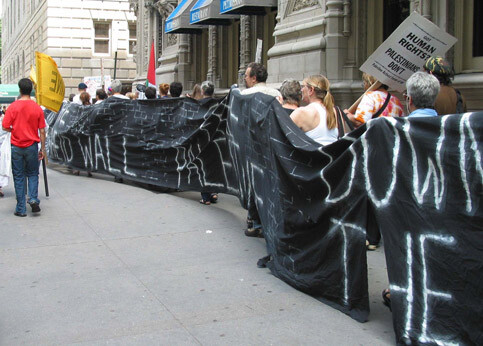
Take the A train to Brooklyn, the message said. Walk one block west. Meet at the basement. Call this number if you’re lost and don’t forward this message. Palestinian Activist Forum of New York (PAFNY), was planning a demonstration in Manhattan, the Big Apple turned Orange. With the Republican National Convention around the corner, the city would amputate a bridge over one suspicious package. So as PAFNY convened last Friday night to prepare banners, placards and leaflets, security precautions were necessary. But not because of Tom Ridge’s three-year-old emails. Any responsible political group takes precautions into their own hands.
In PAFNY’s case last week, key members of their organizing committee were from Jews Against the Occupation (JATO), a group that receives regular attacks from right-wing infiltrators, or fervid Zionists that erroneously deem them “enemies of the Jewish people,” according to the Web site of the Kahane-inspired Jewish Defense Organization.
PAFNY’s “Freedom March,” which took place on July 31st, mirrored the thousands of non-violent protestors who launched a three-week trek from Jenin to Jerusalem alongside Israel’s, now officially illegal, separation wall. Unlike occupied Palestine, where Israeli soldiers detained Jenin-bound buses — making use of apartheid-style checkpoints and U.S. tax dollars — PAFNY members were oppressed by July itself.
A mile into the march, which covered over twenty blocks between Times Square and Central Park, a 67-year-old Palestinian woman opted for a cab. The NYPD was equally, maybe worse, affected under layers of Kevlar and polyester. PAFNY’s only security concern occurred early in the march, when demonstrator Ann Shirazi was physically attacked. “As we crossed 48th Street, marching and chanting, a woman in her 30s darted from behind a newsstand and, with raw hatred in her eyes, made a bee-line for me,” Shirazi explained. The assailant, screaming obscenities, punched Shirazi in the stomach, whereupon Shirazi’s son, Arya, grabbed the woman and stopped her from escaping. The woman eventually apologized. “Rather than hold up the march by taking her to the police (who were nearby but did not see the incident due to the newsstand blocking the view of the street), we let her go,” Shirazi told me in an email.
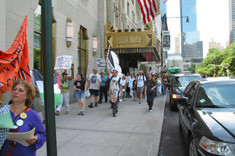
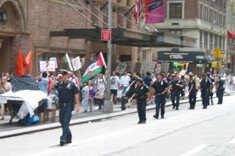
What separated this demonstration from others was PAFNY’s public call for the right of return for Palestine’s 6 million refugees. Though slowly gaining acceptance in most activist circles, the right of return is a subject of controversy for the mainstream. JATO’s decision to take this stance last Saturday was, in many ways, a bold move, as it separated JATO from many other Jewish groups on the left. JATO has already earned a reputation for creative forms of non-violent protest. On January 11, 2001, the group “occupied” a branch of the Israel Discount Bank. On March 26, 2003, ten days after American activist Rachel Corrie was deliberately — by all present accounts — crushed to death by an Israeli bulldozer (compliments of Caterpillar), eleven people chained themselves in a supine human barrier across Fifth Avenue in Manhattan.
The covert assembly called itself M26, and eight of its participants were from JATO. Several other M26 members then set up a plywood bulldozer (not compliments of Caterpillar, but Caterpillar nonetheless) with placards that said, “Witness to Israeli War Crimes.” Two M26ers were chained to the bulldozer, while three people held stop signs to prevent accidents. It was rush hour. They waited. “The corner we chose was very convenient because it was right next to Bank Leumi, the Israeli bank,” says Steve Quester, one of JATO’s organizers.
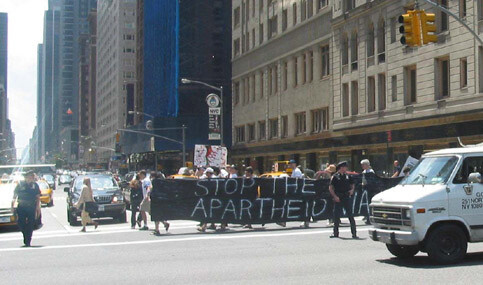
“It was not a demonstration against Bank Leumi, but at least it gave us a connection.” Quester, 41, is a kindergarten teacher in New York. His shorn scalp (Quester is almost entirely bald) is offset by a comical salt-and-pepper Vandyke that he started growing in Palestine, while he worked with the International Solidarity Movement (ISM). He has been to Palestine several times, but as we spoke last Thursday, he had just returned from the doctor, who ordered him to stay away from carbohydrates.
“After this weekend I’ll need comfort food,” Quester interjected. “Jew Food: bagels with lox and cream cheese.” What the M26ers didn’t realize, Quester recalled, was that their demonstration site was in the heart of Manhattan’s diamond district. “A lot of people who passed by there happened to be very committed, religious Jews—not the kind of religious Jews who reject Zionism, but the kind who embrace it,” Quester said. It didn’t take long for passerby’s to grasp M26’s message and form a hostile mob.
Realizing that verbal insults were insufficiently hostile, some mobsters bought coffee from nearby breakfast carts and emptied it on the demonstrators. Next the mob began stomping. First they tried the bulldozer, which shattered into splinters. Then they went for heads. Luckily, M26 brought a security contingent that held the stompers off until police arrived.
Meanwhile, two of the JATO members chained to the street began singing peace songs in Hebrew, to calm the crowd. Since then, 16 M26 members have been charged with disorderly conduct and “obstructing governmental administration” (the hostile mob was never prosecuted). District Attorney Robert Morgenthau offered no plea bargain, though such an offer is commonly granted. In his prosecution, Morgenthau singled out Quester, Kate Barnhart, Lysander Puccio and Staci Smith, who have a history of civil disobedience in queer and minority rights politics, by dredging up cases that were previously dismissed, or that were, by some arguments, inadmissible. Of the four, only Quester was from JATO, although the rest are regular advocates against U.S. and Israeli aggression.
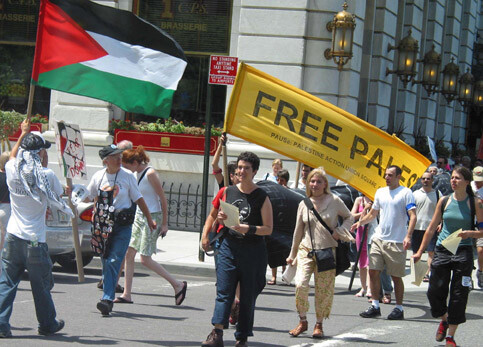
The sentencing is scheduled for November 2004, and jail time remains a real possibility for Quester and the other three. Morgenthau claimed that the M26 demonstration could have blocked emergency vehicles and endangered lives, which seemed dubious to those present. After the NYPD dragged the demonstrators to a curb (only one side of the human chain was connected to something), the police cars continued blocking Fifth Avenue for several hours.
“Of the 16 of us who were busted, I think eight of us were ISM veterans,” Quester recalled. “At least two have ridden in Palestinian ambulances at much risk to their own lives, to protect Palestinians from Israeli gunfire. It was particularly galling when the prosecution brought up this theoretical concept that we were blocking ambulances.”
Ten days before Saturday’s wall demonstration, JATO called for endorsements from the variegated solidarity groups of PAFNY. Several endorsed the call — including Al-Awda and SUSTAIN (Stop US Tax Aid to Israel Now) — and became active participants in scheduling radio interviews, preparing permits and sound equipment. It seems that advocates of any general cause would rather unite their numbers than quarrel over rhetoric. However, not since the fall of South African Apartheid has a liberation movement had such unique circumstances.
Zionism, like Apartheid, favors the privileged existence of one society at the expense of another. Under that framework, any “peace process” —Oslo, Clinton’s meager Camp David attempt, or, even worse, the Road Map — is arguably disingenuous because it requires the oppressed to give up more than has already been surrendered. Where one side sees peace, the other feels formalized deception.
Invariably, Israel’s deception is aimed at the right of return for Palestinian non-Jewish refugees, since this right threatens the Zionist vision of ethnic exclusivity. Organizations like Al-Awda (Arabic for “the return”), advocate the right of return for precisely that reason, arguing that Israel’s apartheid state naturally requires an eternal cycle of conflict. Others are not as ready to forego the hope, however unsustainable, of an exclusive Jewish state in historic Palestine.
Brooklyn Parents for Peace (BPFP), for example, withdrew its endorsement from PAFNY’s call and cited its official stance: “Palestinian acceptance of negotiated limitations on the right of return in exchange for financial compensation for refugees.” Al-Awda viewed that position as setting a price tag on justice, while a BPFP member called the right of return “divisive.”
“Either we stand for international law or we don’t,” Quester told New York solidarity groups last week. “The illegality of the wall is based on the Fourth Geneva Convention, U.N. Resolutions 242 and 338, and the recent ICJ (International Court of Justice) ruling and the U.N. Resolutions 181 and 194. The right of return is also grounded in the Universal Declaration of Human Rights. What kind of a solidarity movement stands for international law in one instance and ignores it in another?” The right of return stood, and BPFP withdrew its endorsement — for now, perhaps.
When I asked Quester why JATO had acted so decisively on the right of return, he explained that there are not many opportunities for Jews who perceive an inherent contradiction in the “Zionist left” — that is, those who criticize Israeli brutality without questioning its ethnically purist motives. “The Zionist left is a useful thinking space for Jews who have been taught that it’s disloyal not to be Zionist — it can be an ideological waiting station on your path to the anti-imperialist left,” Quester said. “But if you get stuck there, it’s counterproductive.” Quester views JATO as an opportunity for Jews who, like him, have felt alienated by Zionist sympathizers.
I asked Quester what gave him confidence that the debate over Palestine would take a just course. “The demise of Apartheid in South Africa,” Quester replied, referring to the economic collapse that ushered the fall of that regime. “The end of Zionism is absolutely inevitable. What is not hopeful is that given how entrenched the U.S. and Israel are right now, there will be a lot more bloodshed and suffering. Palestinians have outlived and triumphed over the British, Turkish, Byzantine and Roman occupations, and there’s no reason to think that they won’t triumph over Israeli occupation.”
Zachary Wales is an activist with the New York Chapter of Al-Awda, the Palestinian Right of Return Coalition. He moved to New York in October 2003 after working in Namibia and South Africa for four years as a media research consultant and news correspondent.
Related Links



